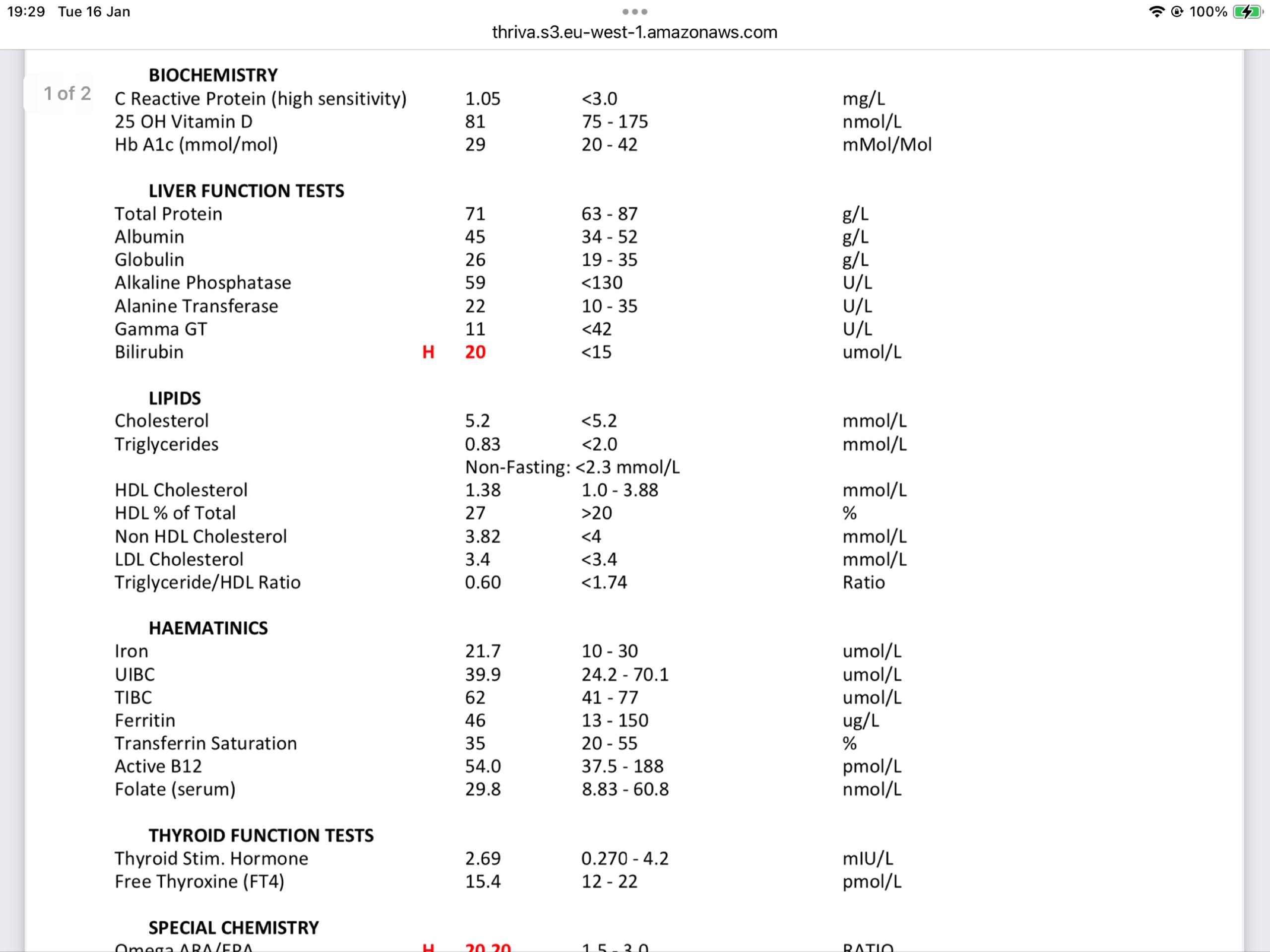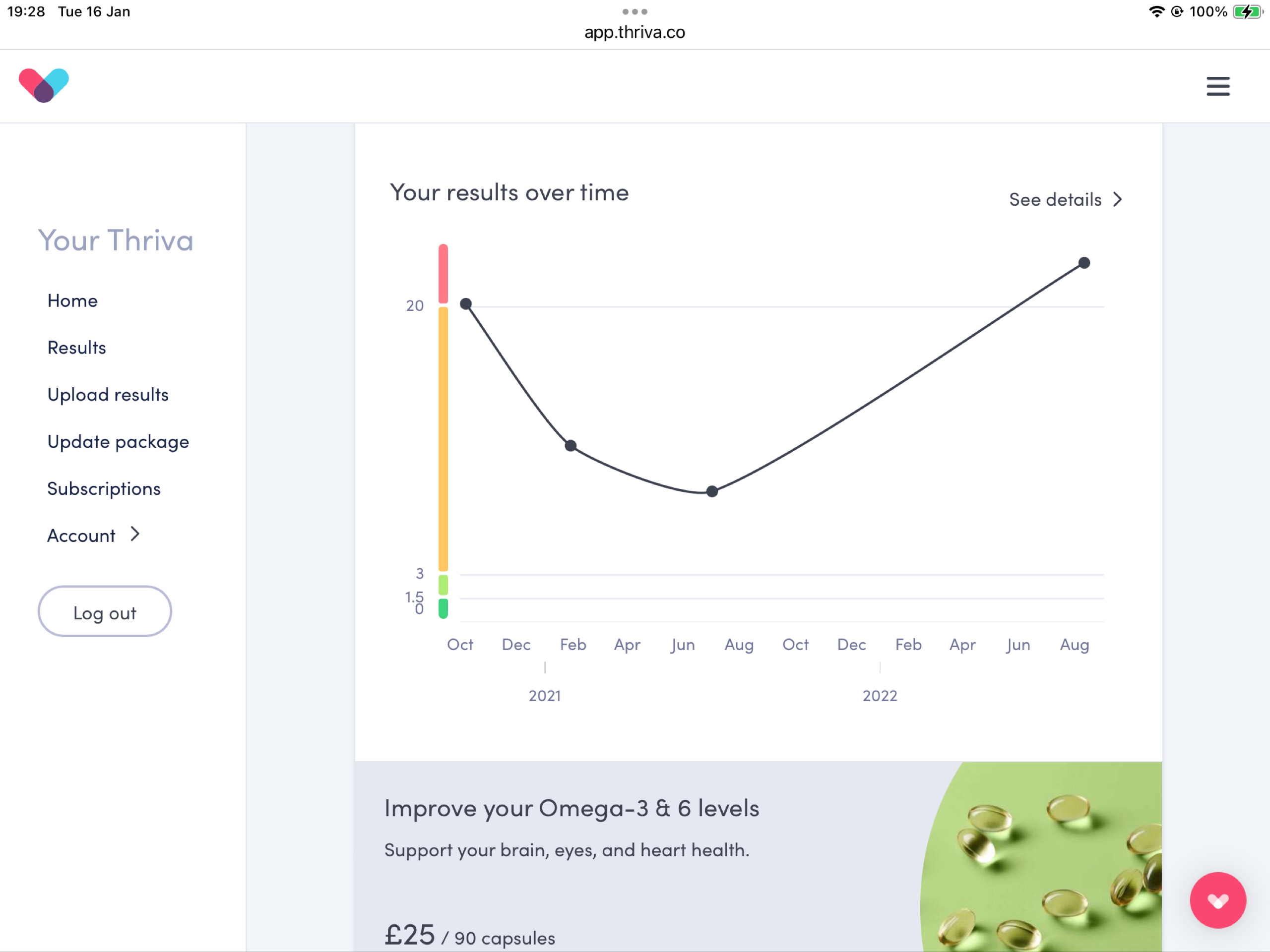Supplements for the Deficient!
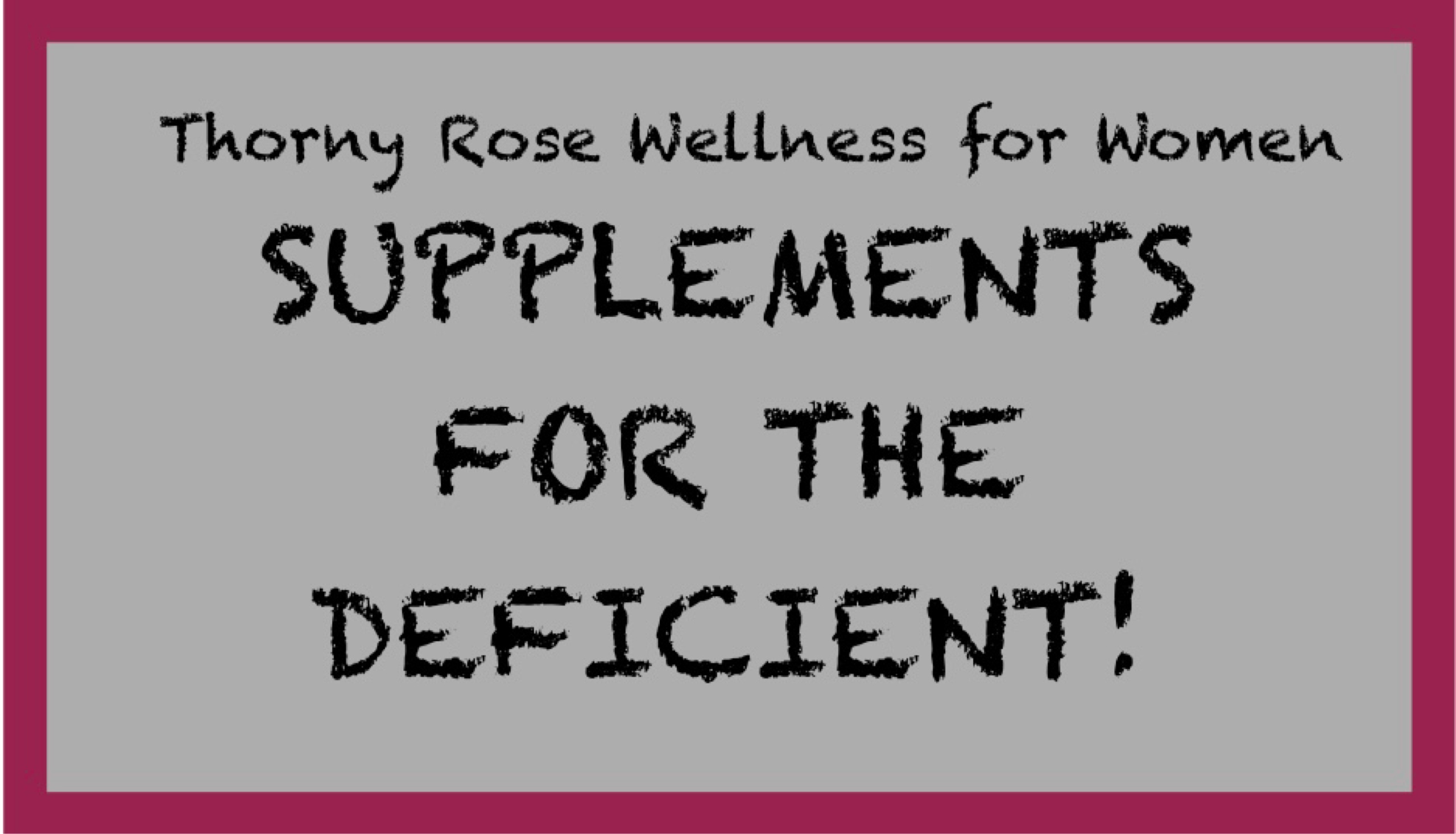
[15 minute read]
This is another surprisingly polarising topic. There are people who swear by mega doses of various vitamins and others who say this is producing very expensive urine! Or that it's causing dangerously high levels of fat soluble vitamins to be stored in the body.
The challenge as always is getting to the bottom of the conflicting advice and evidence. And checking that people are answering the question that you’re asking. If the answer is that vitamin supplements don’t really reduce your cancer risk, but your question was “will Vitamin D help my bone density?”, then that study and those conclusions aren’t relevant! It’s also worth noting that so many studies are only done on men, and the results extrapolated to women, which isn’t always a valid approach.
It’s also true that sometimes people’s messaging is designed to be corrective: “we all know that we need good vitamin D levels but we don’t need as much supplementation as people take”, can lead to people thinking their levels are ok, when they are not.
It’s also very much the case that on just about any topic you will find plenty of directly conflicting advice. “Ten foods you should include in your diet for optimal health” and “ten foods you should never eat” might contain a surprising number of the same foods!
On balance, the evidence comes down on the side of taking a broad spectrum multivitamin with minerals, on the basis that even people who eat healthily are unlikely to get everything they need from their food intake, but of course it’s more nuanced than that!
Ideally, supplementation would be implemented on the basis of knowing what we were lacking, and to what extent.
If you can afford it, it’s possible to get your blood analysed, and then re-tested after a few months to see if your levels have improved. I did this a while back, and it is really useful to know. I’ll talk you through some of my results so you get an idea of how that sort of thing works.
Generally, you fill out a questionnaire outlining which areas you’d like to improve (lack of energy, brain fog) or what symptoms you have, and they suggest tests. Some of them are quite inexpensive, some of them are more involved and cost more. Then you get a report from a GP, explaining what your results mean. You can also see where you are in a range - quite often if you get, say, your, B12 levels tested by an NHS doctor, they will say they are “normal”. But what’s considered “normal” in the UK is considered “low” elsewhere, and it might be that YOU need your levels to be higher. You can also test for things like thyroid function, inflammation levels, cholesterol, liver function, lots of useful markers.
It's also possible that your results won't be easy to read, so it's hard to mine into the data yourself. For instance, the graphs and data the blood testing company produce are easy to read and understand, but the downloadable report they give you if you want to take it to your doctor is not!
But it’s hard to get levels tested in the UK, and as often as not they’ll suggest the expedient of taking a particular supplement for a few months and seeing if there’s an improvement. Or if they do test, they won’t usually re-test, because the assumption is that if you take the supplement, your levels will increase.
By and large this is often true, but it is also often the case that there is an issue with absorption - either because the supplement itself doesn’t have high bio-availability, but also because your body might have issues with absorption. This is often particularly true with B12.
How you take the vitamins is also worth considering. Chemically, there may be absolutely zero difference between the cheapest ones available and the most expensive ones. The mark-up on products within the lifestyle supplementation industry is absolutely astronomical, so if a cheaper product *does* do the same job it’s worth going for. The expensive formulations are often marketed as “just 97p a day”. That’s nearly £30 a month. And I need at least 3 different ones? That’s not affordable for many folks. However, it is the case that sometimes some “versions” of the product are better than others, and are experienced by the body differently. Magnesium, for instance, comes in many different compounds.
Obviously, the best way to get the majority of our essential vitamins and minerals is via quality fresh food. It is indeed the case that organic food has a higher nutrient level than non organic food, but some vitamins (such as Vitamin D) don’t come from food, and some minerals are in very low amounts due to low uptake from the soil.
Some people like to get their intake via “superfood” powders. More on that in another article, but there are some tasty products that are very high in not just certain vitamins but also beneficial active compounds.
All the vitamins are important, of course, the clue is in the name - the “vit” part is short for vital, and to be a vitamin a compound has to be essential to health. Some of them, however, are particularly important, especially for women, and deficiencies are common. Let’s start with magnesium.
Magnesium influences mood regulation, lowering the risk of anxiety and depression, supports healthy bones and hormone levels, and is involved in hundreds of biochemical reactions throughout your body. It regulates the circadian rhythm and adequate levels can improve quality and duration of sleep. It also supports heart health.
This is quite a useful article if you want to read further:
https://www.healthline.com/nutrition/magnesium-for-menopause...
Magnesium is present in the soil but its uptake into plants depends on growing conditions, and it is easy to not get enough of it. The consensus at the moment (!) appears to be that magnesium glycinate or magnesium citrate are the best form to take.
The testing company I use doesn't test for magnesium, because most of the magnesium in your body is stored in the bones and other places, not in the blood, so total magnesium concentrations measure in the plasma or serum are not reliable markers of total magnesium levels in the body.
Vitamin B12
If you are vegetarian, or vegan, it is easy to be deficient in Vitamin B12, as it only occurs naturally in animal foods, and in yeast extract (ie, marmite). It is also possible to consume adequate quantities, either naturally or via tablets, and have difficulty absorbing sufficient amounts. In this case soluble options, or injections, might be the answer. If you’ve had the experience of trying to get Vit b12 in adequate quantities via a GP, you’ll know the challenges!
So why is it so important? Vitamin B12 deficiency is debilitating. The symptoms are often diagnosed as fibromyalgia, which is really just a way of describing widespread pain throughout the body. A deficiency in Vitamin B12 can lead to: weak muscles, numbness, nausea, weight loss, irritability, fatigue, and increased heart rate. Also, brain fog, memory loss, a loss of balance and co-ordination, depression, anxiety. Also, mouth ulcers, burning tongue, and vision issues. Really rather a lot of these are very similar to menopause symptoms!
Unless you are confident that your B12 levels are good (ie, you eat steak regularly!), it’s a good idea to either: use supplementation and see if you feel better or; check your levels, use supplementation for 3 months and either see if you feel better or check levels again!
I'll show you my results for B12 so you can see how it works.
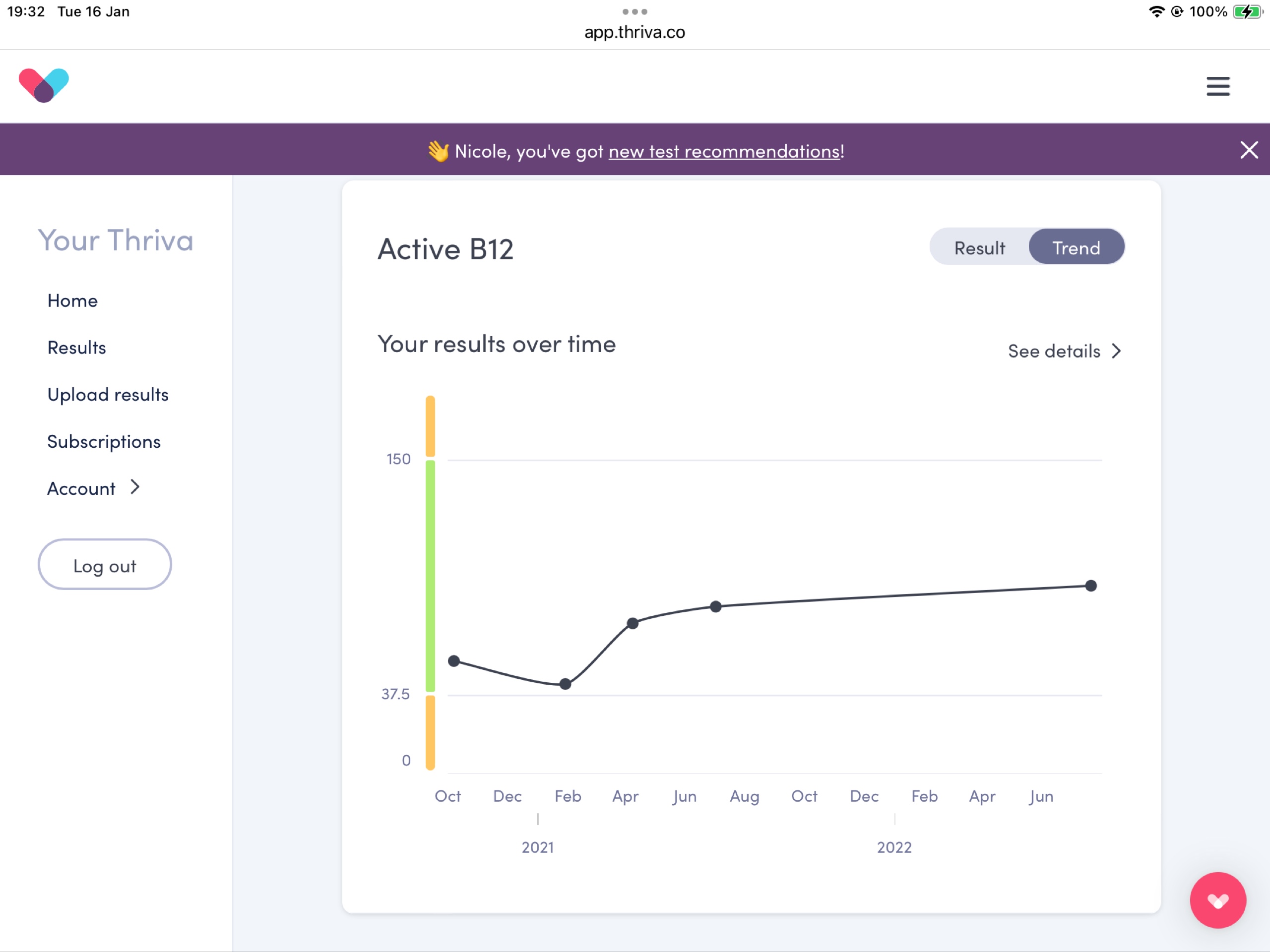
I saw that the levels were on the low side of optimal, which is indeed a wide range, and started to supplement. I haven’t been consistently supplementing since, so I would be wise to test again now, and then again after supplementing for a few months. I bought their expensive capsules, which are highly absorbable. It would be interesting to know if tablets from the chemist will do as good a job - I think for me they probably would.
Updated June 2024:
In fact, as so often happens, I didn't consistently supplement, and you can see my levels have dropped. I am now fairly regularly taking a supplement - we shall see what difference it makes next time I test!
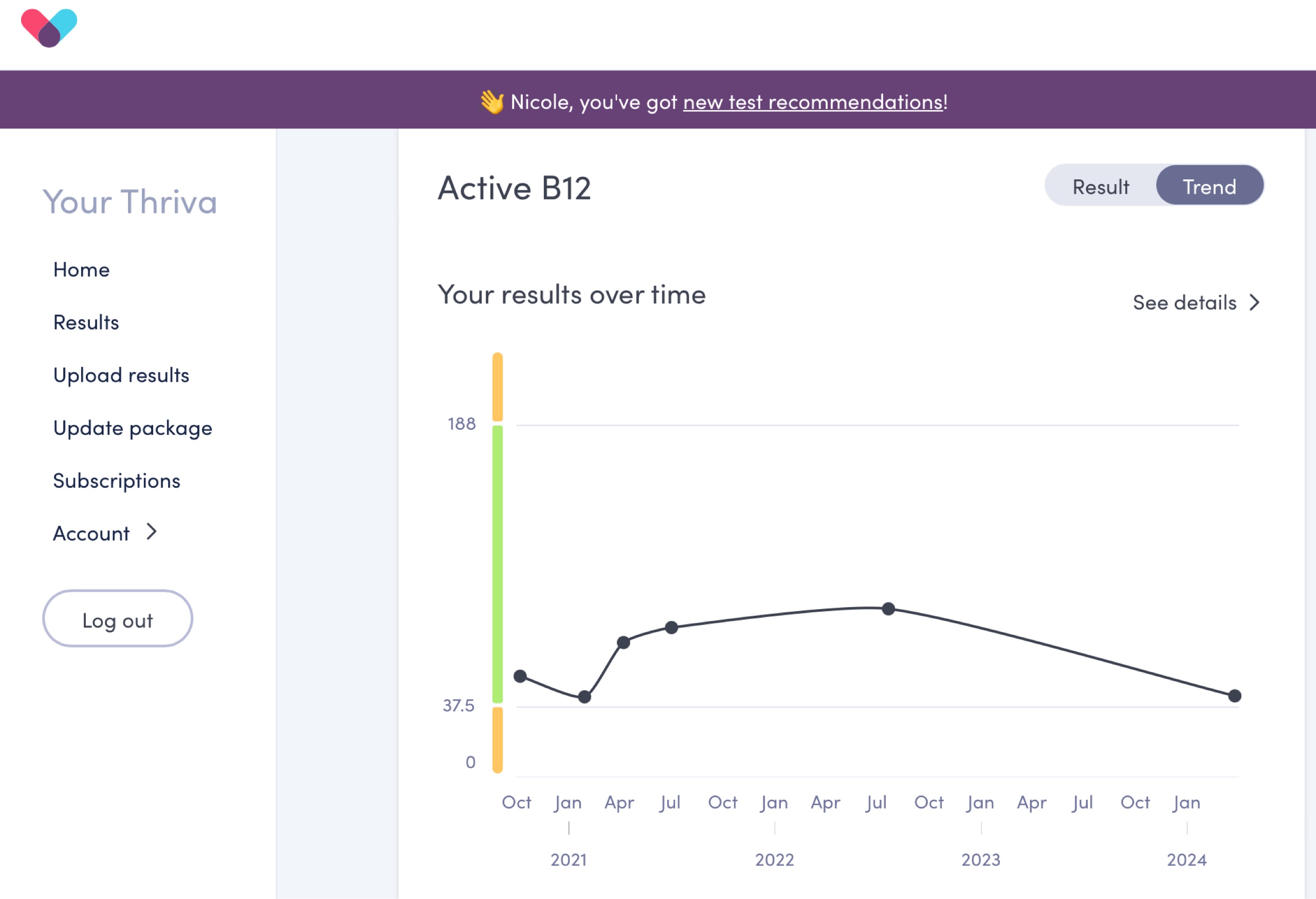
Vitamin D. This is actually now classified as a hormone as much as a vitamin, and we are unlikely to get enough from sun exposure in the UK for much of the year. This week's Just One Thing is about taking Vitamin D, and I've included the link here. It is considered absolutely crucial for healthy bones, very much an issue for women as they get older. https://www.bbc.co.uk/sounds/play/m001vclt?partner=uk.co.bbc...
These are my results for Vitamin D:
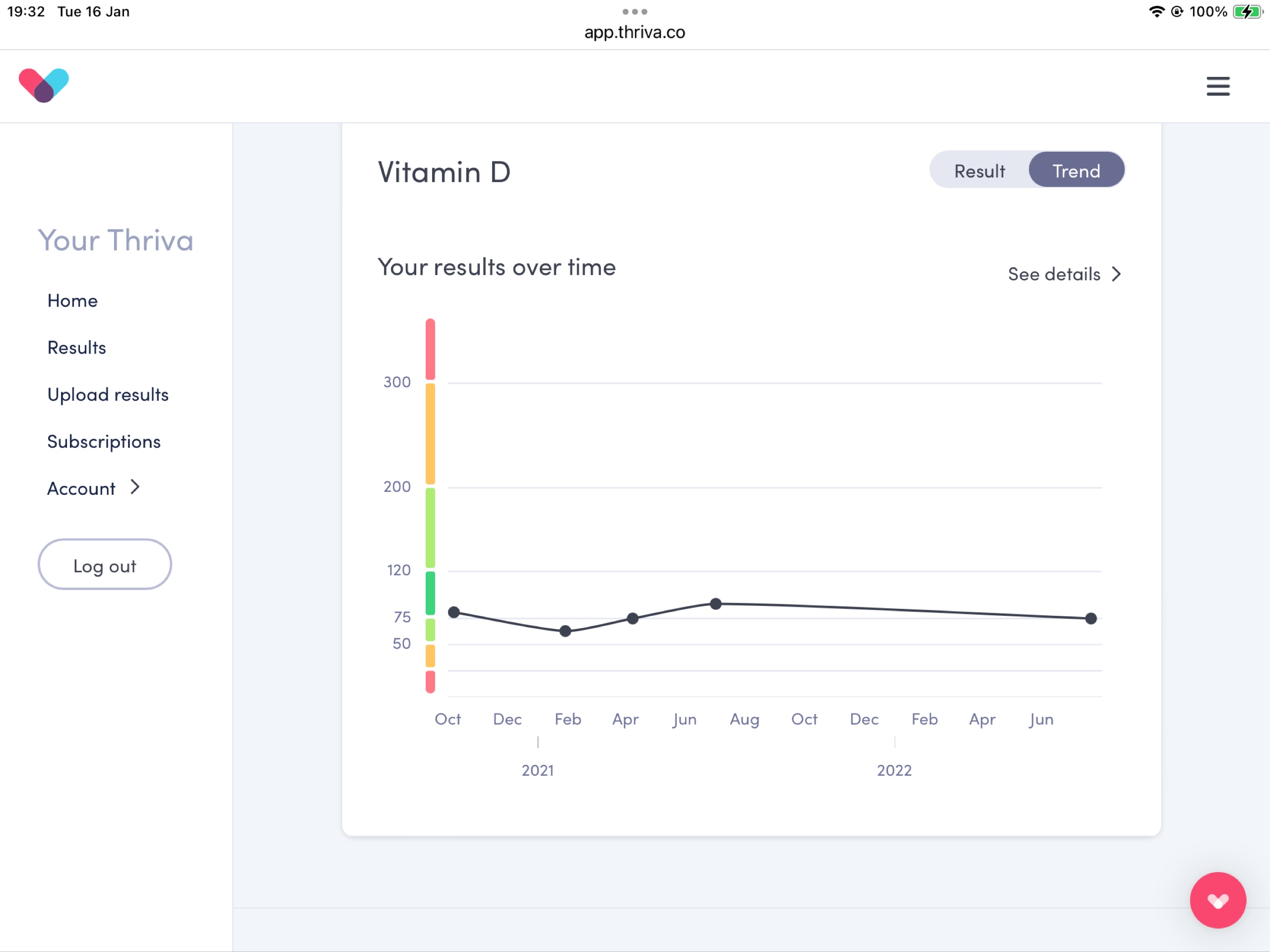
The last two tests were both done in the summer - you can see that levels were lower at the end of the winter than going into it. Winter (where we happen to be now at the time of writing this article) would be a better time to test.
Updated June 2024:
As you can see below, I did test again in the winter, and stores were depleted. There is occasional sun but I am continuing to supplement - there's quite a wide range of "normal" the higher side of "optimal".
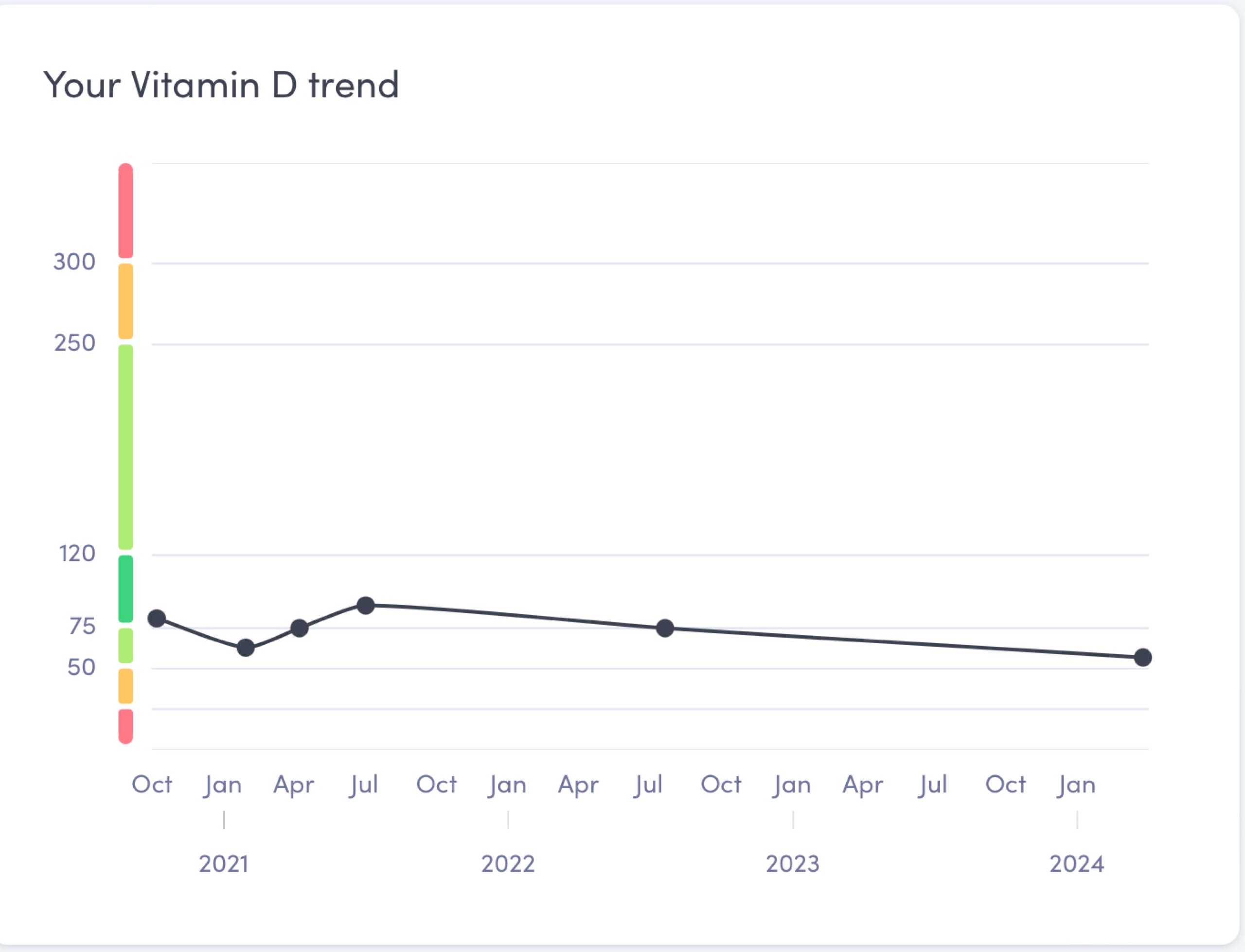
I was also interested in my diabetes risk, and this test measures your average blood sugar over the last 3 months.
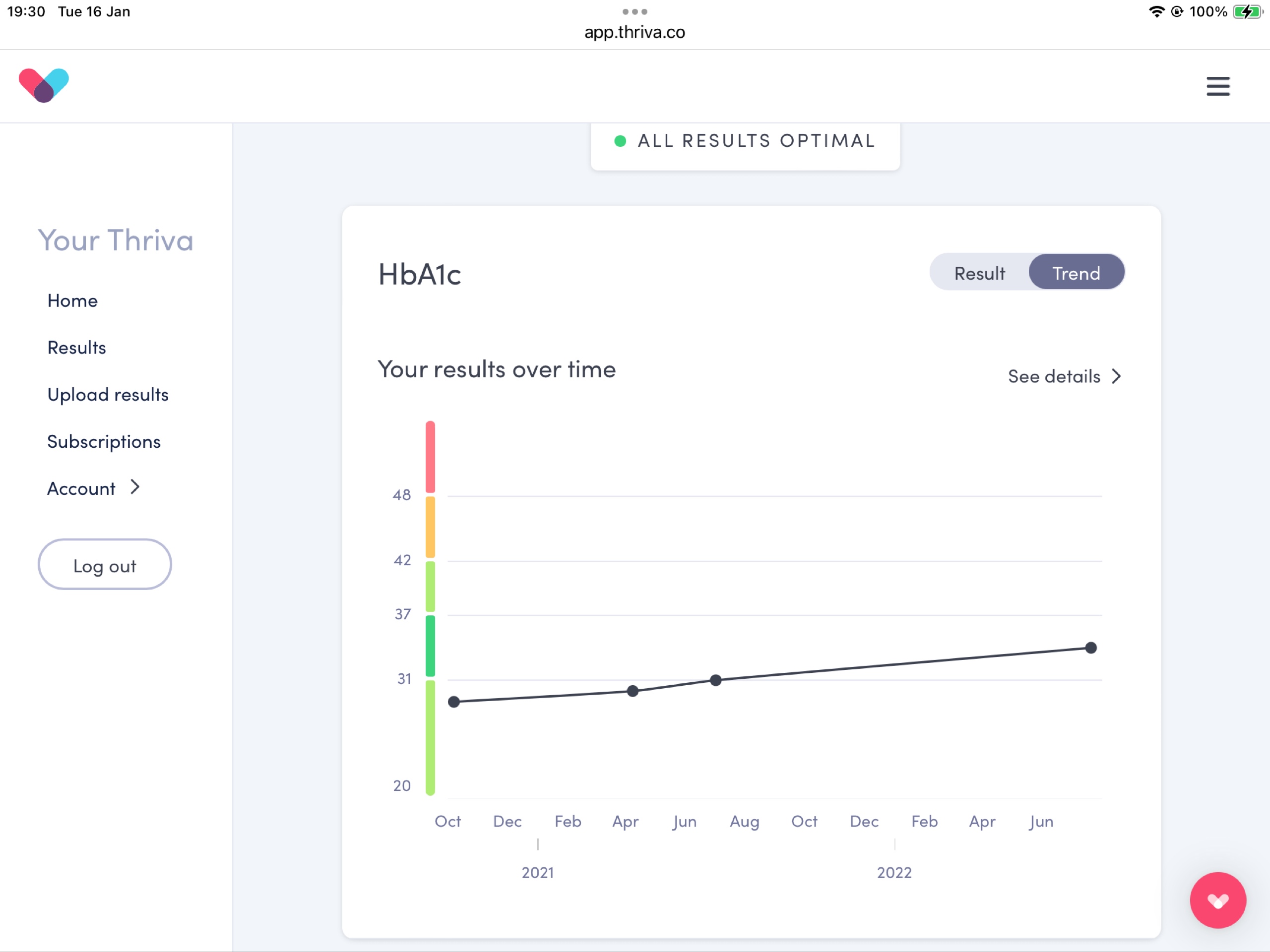
Of course, I’m delighted by this - my levels are optimal, but they are going up - at £11 perhaps it would be good to check that trend?
One thing that I did find interesting was the iron levels. Which didn’t change, whether I was supplementing or not. And they were fine, in spite of a diet low in iron. I don’t just say that because I’m a vegetarian, I also tracked everything I ate via “My Fitness Pal” for nearly a month, and my iron intake was low. Strange, but it's good to know my levels are ok. Iron is one of the first things to look at when energy levels are low, but it is by no means the only one!
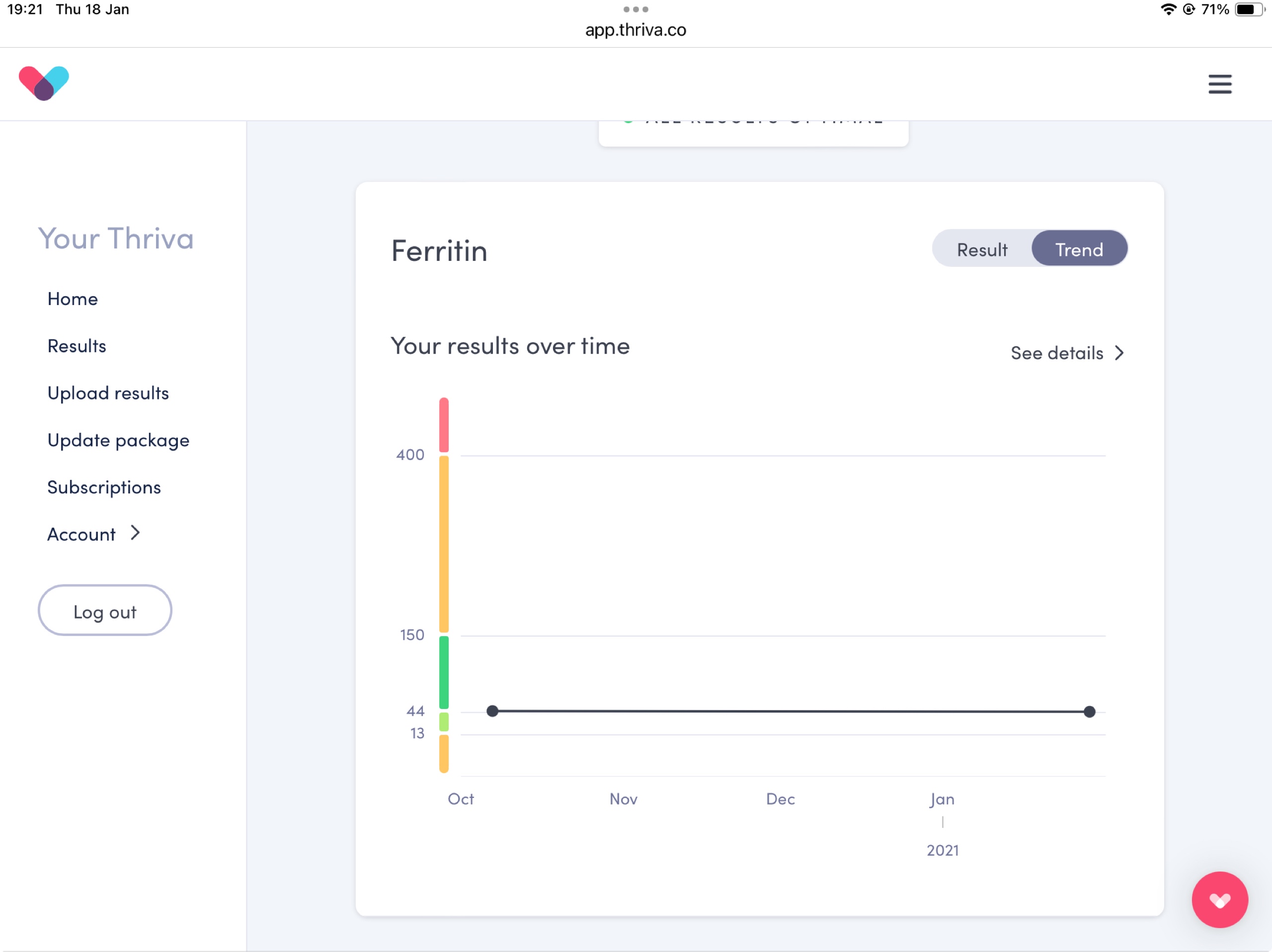
And when I say the ferritin levels are constant, they have gone up a bit, and I would put this down to eating a lot more green leafy vegetables these days.
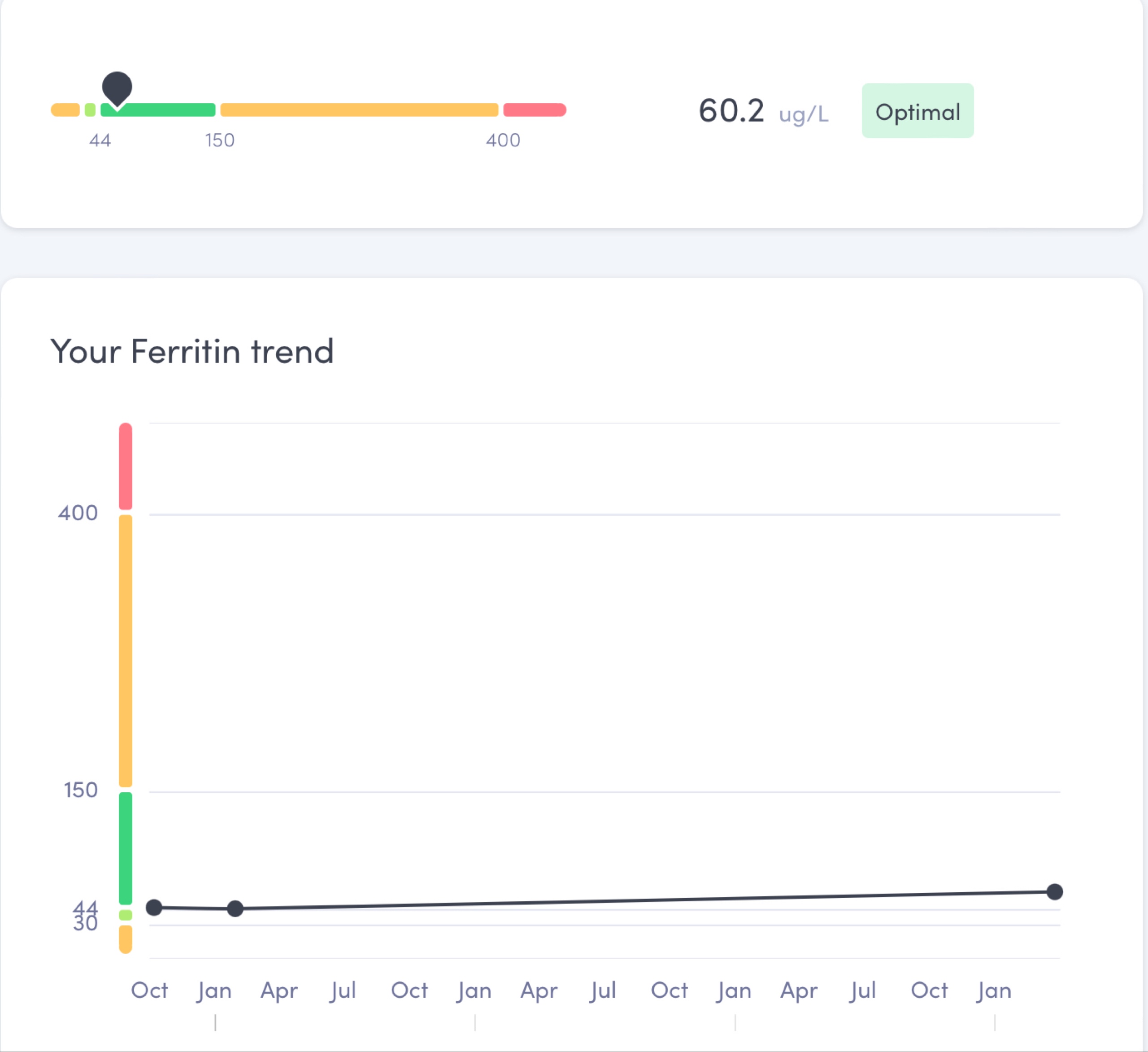
The “Advanced Iron Profile” measures so much more than the simple “ferritin” test which just looks at the amount of iron stored in your body. The Advanced Iron Profile looks at:
Total Iron Binding Capacity (your blood’s capacity to bind and transport iron)
Transferrin Saturation - the amount of iron bound to transferrin, a protein that transfers iron around the body
Ferritin - as above, total amount of iron stored in the body
Iron - important part of haemoglobin, which carries oxygen around your body
Unsaturated Iron Binding Capacity - this measure the amount of transferrin that is not bound to iron. This can check for iron deficiency or overload.
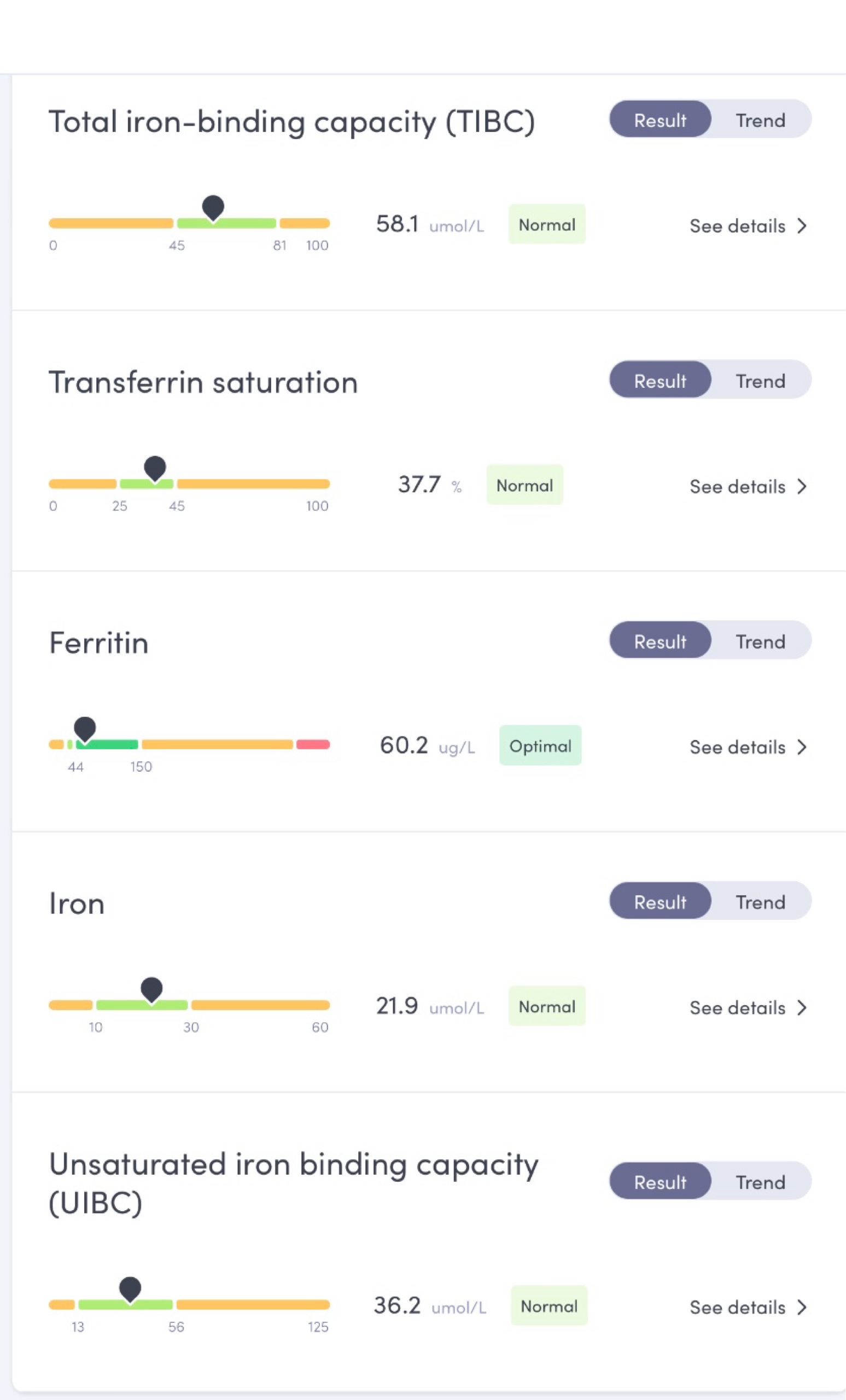
When you do the test, you get a lot more information about all these different things. For instance, this is a bit of information about “iron”, and in the Advanced Iron Profile you get lots of detailed information about how the different measures fit together to give you an accurate picture of what is going on.
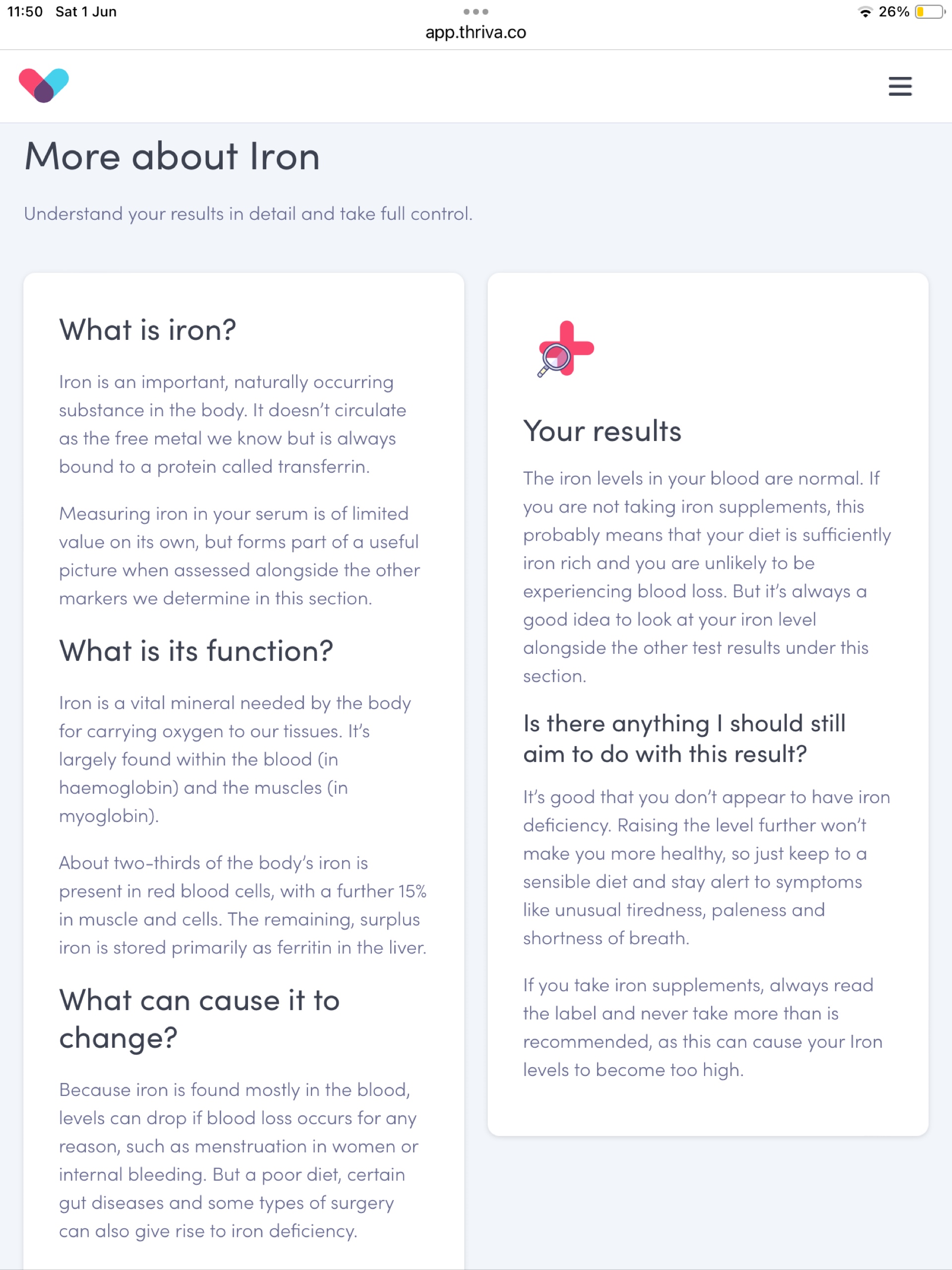
I tested for a few more things - as you can see on this page, and all were fine. The amber on liver was due to a raised level of bilirubin, but with the rest of the liver function being optimal, that’s likely to be a genetic thing and not an issue. So I was really happy with my scores. Except for my omega 3 levels and my omega 6 to 3 ratio.
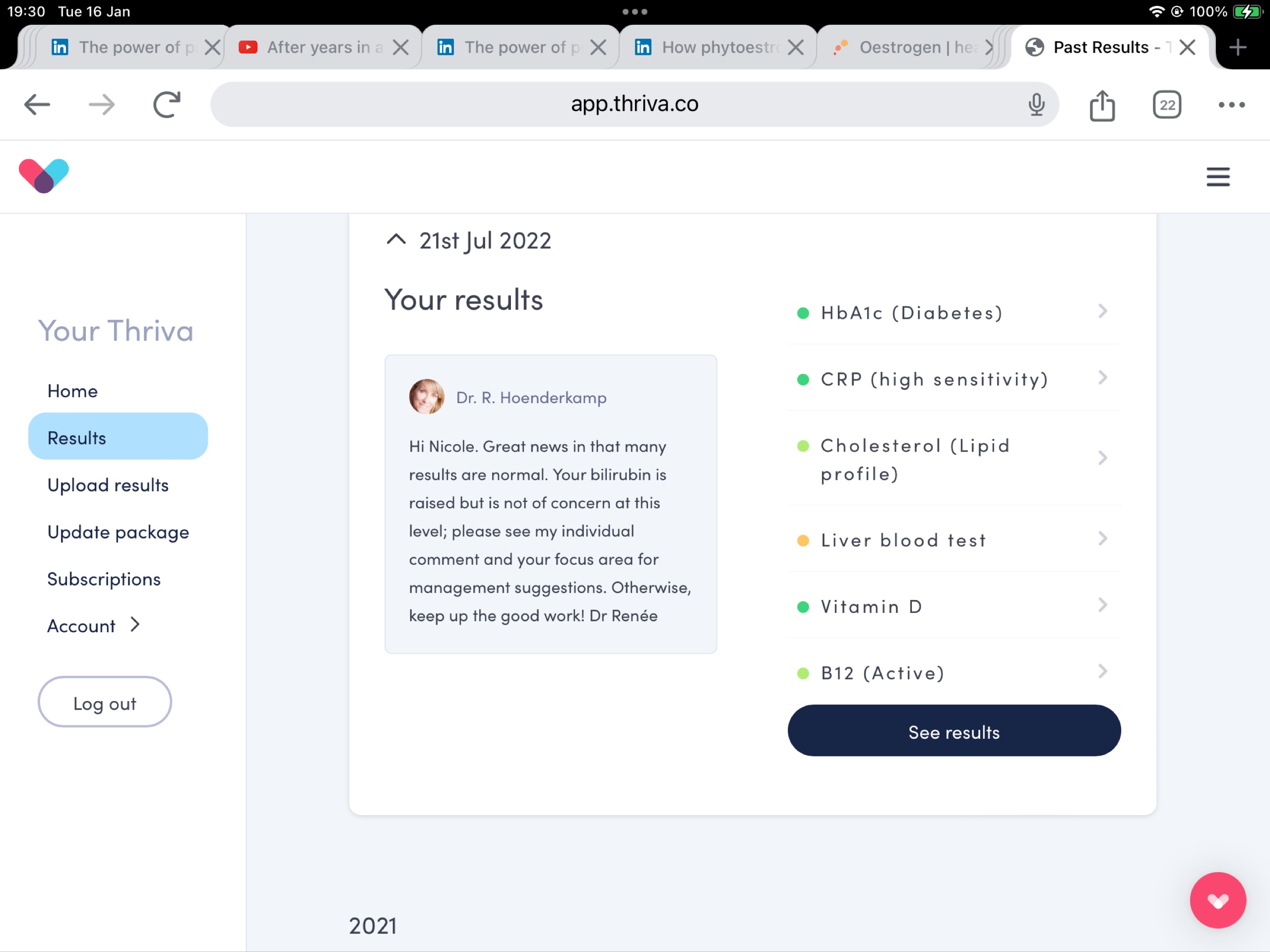
So, I had listened to a book that went very deeply into Omega 3 and Omega 6, and particularly the ratio, and I was concerned about my levels. As you can see, they were terrible! I’m not 100% convinced by the science, although in the effort to improve my levels I gave up crisps (which are usually fried in sunflower oil, which is high in 6 and low in 3) and I think that was a good thing. It was a huge amount of effort to change the levels. Many nuts and seeds are in a “bad” ratio and so some would recommend avoiding them. I can see that we might all need more Omega 3 in our diets, and the idea is that the omega 6 and omega 3 compete for the same receptors, and so too much omega 6 is not a good idea. But it may be that the omega 6 you get from eating crisps fried in sunflower oil might present more of a problem than those found in nuts. In any case, I decided not to continue my efforts in getting better levels and you can see the level shot right back up!
Update:
It had been a while since I’ve tested. It’s felt like a bit of an indulgence, but this has inspired me to go back and check the levels of a few things again, partly because my diet has further improved since the last test, and also because I wasn’t in menopause the last time I tested.
If you’re interested in taking the tests yourself, I do have a code to give you 20% off. It's here: Thrivacode: L2DZUNQJ7WM.
Or of course other companies are available!
Any questions? Drop me a line.
